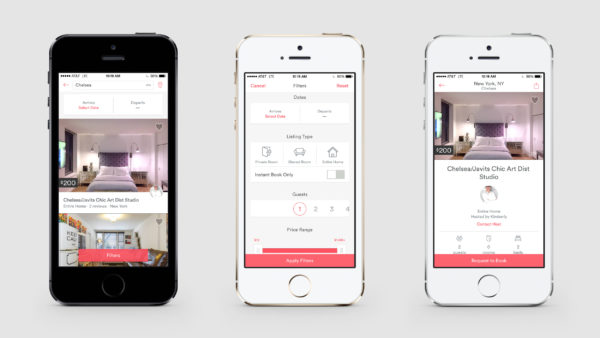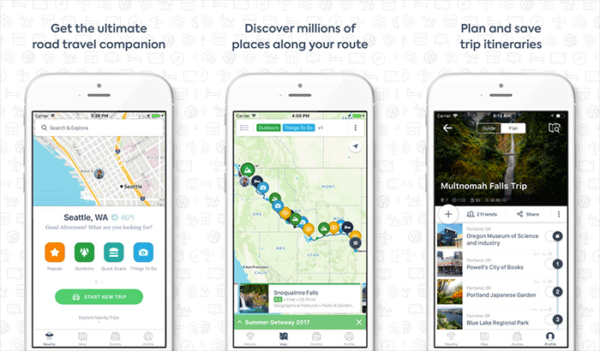Travel Booking App Development: 6 Must-Have Features
Just a few decades ago, planning a trip without the help of a travel agency was nearly impossible. Fortunately, today, with the help of travel apps, anyone can become their own travel agent.
In recent years, mobile travel apps have become useful tools for searching and booking hotels and flights with just a few taps on the smartphone screen. According to Social Media Today, around 43 percent of consumers say they use their smartphones to look for accommodations, while 25 percent of consumers claim that they use their smartphones to make bookings. Social Media Today also notes that digital travel sales are expected to reach $198 billion by the end of 2018, which means that the digital travel sector is going to grow significantly.
Since the landscape is evolving, it’s important for business owners to understand the current trends in the travel industry to provide quality travel products that fully satisfy the needs of end users and help travel businesses flourish at the same time. In this article, we talk about how to build a mobile travel application by defining a set of must-have features that will make your app extra helpful and attractive for consumers.
What are travel apps and how do they help travellers?
Travel apps may help you a lot in planning a flawless vacation. As users take vacations to relax and have a great time, they definitely don’t want more stress added to their lives with chaotic and messy vacation planning. For travellers, planning a trip through a mobile travel app is simple and stress-free.
- Travel apps let travellers quickly find and book their stays anytime, from anywhere, by providing a detailed description of each accommodation spiced up with real photos, ratings, and feedback from past visitors.
- Travel apps allow users to pay for their stays instantly using built-in payment functionality. Moreover, users can easily cancel their bookings and be sure they’ll get their money back.
- Travel apps suggest local places to visit and things to do so that travellers don’t have to spend their time looking for a guide.
- Most travel services provide real-time support for their users by integrating an in-app chat powered by either a real concierge or an AI-powered chatbot.
Who rules the online travel market right now?
There are several major players in the travel field right now.
- Expedia Group is probably the most famous name in the online travel booking field; sites owned by Expedia Group include travel fare aggregators and travel metasearch engines: Expedia.com, Hotwire.com, Hotels.com, CarRentals.com, Orbitz, Venere.com, Trivago, Travelocity, and HomeAway. They have businesses all over the world. With all these apps used by millions of people around the globe, Expedia Group definitely rules the industry.
- Booking Holdings, previously known as the Priceline Group, is also a popular company that owns several travel aggregator applications including Booking.com, Priceline.com, Agoda.com, Kayak.com, Cheapflights, Rentalcars.com, Momondo, and OpenTable. The company’s travel applications support about 200 countries and about 40 languages.
- Lastminute.com Group, with its legendary last-minute booking service Lastminute.com, based in London, is also on the list of the most successful travel companies worldwide according to Statista. Other brands owned by the Lastminute.com Group are Volagratis, Rumbo, Bravofly, Jetcost, and Hotelscan. The company’s services are present in more than 40 countries and reach around 43 million users every day. Some of the closest competitors of Lastminute.com include HotelTonight (a last-minute booking service which now operates in the US, Europe, and Australia), One Night (offering last-minute booking for boutique hotels), and Hotelquickly (a last-minute booking app that targets the Asian market).
- Airbnb, established in 2008, was a bit of a non-traditional accommodation booking service at the time. Operating as an online marketplace for people looking for short-term lodging including holiday cottages, apartments, homestays, hostel beds, and hotel rooms, Not possessing any of this real estate itself, Airbnb plays the role of a broker between individuals who own an apartment and those who want to rent it. Right now, Airbnb has 5 million accommodation listings in 81,000 cities and 191 countries around the globe.

Key features of a successful travel app
Even though there are already a number of well-established digital travel services, it’s never too late to build a niche travel app for your local market. Let’s see what features your travel app would be impossible without.
#1 – Search and reservations
No doubt you’ll need to integrate your app with a meta search engine that lets your users look for accomodations. Being the central feature of your app, the search engine should be equipped with powerful filters to help your users find exactly what they want. While the required fields usually include destination, check-in and check-out dates, and number of guests, most popular apps also include filters like price, number of stars, purpose of travel, distance from city center, and the opportunity to stay with a pet.
Mind you, your travel app should also be location-aware. This feature can help your users quickly define their whereabouts so they can get a list of travel options in the area. There are a number of map and location service APIs that can help you make your travel app location-aware, such as Google Maps and Apple Map Kit.
#2 – Personal accounts
You can also let your users create personal accounts by registering in the app either via email or social network accounts. With a personal account, users may easily change the settings of the travel app, such as their current location, language, and currency. Moreover, users can get personalized travel recommendations adjusted to their preferences and booking history and find out about the hottest deals first.
Authorized user access to the app works perfectly for travel app owners as well, since they can easily gather information about users and use it for promotion and customer retention.
#3 – In-app payments
In today’s highly competitive travel world, it’s vital to integrate your app with a payment gateway so that users can pay for their stays right in the app.
There are numerous APIs that allows businesses to enable payments in their apps, such as Braintree, Stripe, and PayPal. While the first two let users enter their credit or debit cards in an app to make payments, the PayPal API lets users pay for services using their PayPal accounts.
#4 – Notifications
Using push notifications, you can keep your users posted on recent events: the hottest new travel deals, an upcoming check-in, a change to their reservation, and so on.
Kayak, a popular travel search service, allows users to set their own notifications for prefered destinations, dates, and prices; users then get alerts if the price for a destination and date drops below the point they’ve chosen.
#5 – In-app concierge
Integrating your travel app with an in-app concierge is definitely the best way to take customer support to the next level.
Whether it’s a chatbot or a real human on the other side of your app, an in-app concierge can help your customers in various matters – from providing information on recent hotel and flight deals to assisting customers in ordering more amenities to their rooms or booking tables in the best local restaurants – just by communicating in a built-in in-app chat.
HotelTonight, with its Aces service (powered by real humans), is the brightest example of a travel app that successfully uses such an approach.
#6 – Categories
Of course, you can cover more than one travel category in your app, such as hotels, flights, car rentals, and trains. At the stage of MVP development, however, many travel apps start with only one or two categories. These usually include hotels and flights. Later, after your application has received positive feedback from users and has grown its user base, it’s possible to improve its capabilities by adding more travel services that users will be interested in.
Even though competition in the travel industry is tough, it’s never too late to build a quality travel product that targets local markets. The tips above may help you design a strong travel app that’s bound to win users’ favor and help your business flourish.
About the author:
Yana Poluliakh is a brand manager at Yalantis, mobile and web app development company based in Ukraine. Yana works to improve relationships between Yalantis and its customers by elaborating the company’s brand messaging. She also writes about mobile app development, technology trends, and marketing.

















